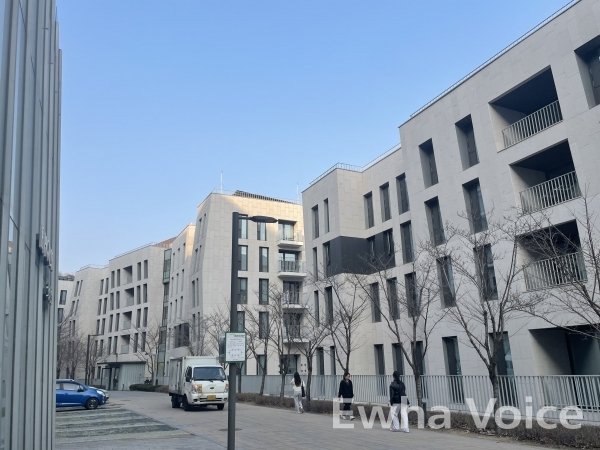
Ewha’s dormitory announced four newly applied penalty clauses via its official website on Feb. 20. These new penalties came into effect the day after the announcement on Feb. 21.
According to the dormitory’s notice board, new regulations have been put in place: banning early morning deliveries, penalizing paint and wallpaper damage, mandating waterproof mattress covers, and prohibiting visitor access to exterior pedestrian passages of E-House. Students who fail to comply with these rules will receive two or three penalty points.
Regarding the prohibition of early morning delivery, the dormitory explained that it has been difficult to deal with fresh food deliveries that are not taken in as they go bad easily. Moreover, leftover boxes have caused inconvenience for those passing through the entrance while also being unsightly. Most of all, the office added that deliveries have frequently been lost or left outside, as delivery drivers cannot enter the building late at night or early in the morning.
In addition, according to the dormitory official, concerns have been raised over delivery drivers entering the dormitory complex during dawn, as dormitory security personnels do not work at that time. Therefore, the office came to a decision to ban early morning delivery starting from this year.
However, students expressed their discontent over the new dormitory policy. According to a student survey Ewha Voice conducted from Feb. 26 to March 4, 97.4 percent of the 72 respondents shared their complaints, especially about the prohibition of early morning deliveries.
Students believe early morning deliveries bring about many crucial advantages, such as receiving urgent items quickly or purchasing products at a lower price. Thus, while it would be understandable when penalty points were imposed if fresh food deliveries were left unattended for a long periodof time, students feel that barring early deliveries entirely is unreasonable. Some suggested that only those who caused problems with deliveries should be disciplined instead.
In fact, the dormitory official stated that before making the announcement, they considered imposing penalty points only when students violate the rule. However, it was practically impossible since the entire personal information of students cannot be revealed on delivery boxes, making it inevitable to take a complete ban on all early morning delivery itself.
Nevertheless, 70 percent of the respondents thought that the penalty points are excessive, particularly when it comes to early morning deliveries. In the survey, one student who wished to remain anonymous believed that imposing penalty points on deliveries was unjust because there has never been any inconvenience caused by it, at least in her case. In fact, out of 55 respondents who have lived in the school dorm, 50 students replied that they had never experienced anydiscomfort due to other students’ early morning deliveries.
In the case of mandating waterproof mattress covers, 46.2 percent of the respondents felt dissatisfied with the new policy. While they agree that waterproof covers are hygienic, having to purchase and install the waterproofcover is a burden to students as there is no financial aid from the dormitory office.
As for the clause, the dormitory official decided to make students prepare the covers by themselves, as changing contaminated mattresses has been one of the major factors of increasing dormitory fees every year.
Yet, Kim Areumbit, a sophomore from the School of Communication & Media, thinks that if the dormitory had notified students of the need for waterproof covers in advance, it would have saved students who had already purchased standard mattress covers the trouble and expense.
“There was no attempt to ask students for their opinions in advance, and there have been several cases of measures that caused students inconvenience, such as stopping elevators to save electricity,” Areumbit said. “In addition, the heating temperature in the winter period was also lowered without any consultation with dormitory residents.”
Despite some support for this measure, some respondents who wished to stay anonymous pointed out that the office should have notified the studentsin advance rather than making unilateral decisions without consultation.
Meanwhile, 90.5 percent of the respondents responded positively to the policy barring visitor access to exterior pedestrian passages of E-House. As there have been many demands among dormitory students regarding the safety of dormitories, the prohibition of access to the outside of E-house seems to reflect the opinions of students. However, several comments still stated that additional measures should be considered for the safety of students living on the first floor of building 300.

